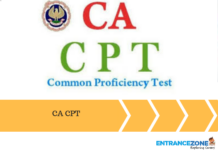Class 12th is the milestone journey of education. 12th-grade marks are always a matter of debate because we often come to the words that state” Marks are not so important in career”, “Marks define career” etc. But truthfully we see that through the marks obtained in the board exam, students get admission in colleges and institutions on the basis of their marks. Students of class 12th have to face the dual pressure of the board as well as the competitive exams.
Admission Open 2023
- Top University & Colleges Official Links, Application & Scholarship Forms.
Through Class 12th Chemistry marks one can have competitive exams such as engineering entrance exam (JEE Main & JEE Advanced), medical entrance exam (NEET), commerce students go for CPT or CS. In every competitive exam, candidates have to acquire a certain percentage in class 12th board exam as per the individual subject.
NCERT Class 12 Chemistry Book 2023
Contains
The National Council Of Educational Research and Training (NCERT) publishes the 12th-grade Chemistry books for the CBSE students. NCERT Chemistry Books For Class 12 are based on the latest syllabus and pattern. Chemistry holds the theoretical as well as the practical sessions. Thus they are advised to be well equipped with the chapters along with the topics.
Subscribe to Get Updated Information about NCERT Class 12 Chemistry Book 2023 : Download Part 1 And Part 2 In Textbooks PDF - Admissions
NCERT Class 12 Chemistry Book is the compilation of the chapters set up after a serious discussion by renowned professors and teachers. NCERT Class 12th Chemistry Textbook contains two parts i.e Part I and Part II that covers the topics for the board as well as the competitive exam. One can have the e-book of both the parts of Chemistry books by visiting the NCERT official site.
CBSE Class 12 Overview
| Exam Name | CBSE Class 12 Board Exam |
| Conducting Body | Central Board of Secondary Education. |
| Medium | English/Hindi |
| Exam Frequency | Once a year |
| Official Website | https://www.cbse.gov.in/ |
NCERT Chemistry Books For The Class 12
Class 12th Chemistry books contain two parts. One can download the pdf as per the individual chapters or can download the complete book. Check out the link here.
- NCERT Book For Class 12th Chemistry PDF (Part 1 in English)
- NCERT Book For Class 12th Chemistry PDF (Part 2 in English)
- NCERT Book For Class 12th Chemistry PDF (Part 1 in Hindi)
- NCERT Book For Class 12th Chemistry PDF (Part 2 in Hindi)
Content For 12th Grade As Per The Part 1 And Part 2 In NCERT Textbooks
The topics covered under NCERT Chemistry are:
PART 1 (English)
| Units | Topics |
| Unit 1: The Solid State |
|
| Unit 2:Solutions |
|
| Unit 3: Electrochemistry |
|
| Unit 4: Chemical Kinetics |
|
| Unit 5: Surface Chemistry |
|
| Unit 6: General Principles and Processes of Isolation of Elements |
|
| Unit 7: The p -Block Elements |
|
| Unit 8: The d- and f – Block Elements |
|
| Unit 9: Coordination Compounds |
|
PART 2 (English)
| Units | Topics |
| Unit 10: Haloalkanes and Haloarenes |
|
| Unit 11: Alcohols, Phenols and Ethers |
|
| Unit 12:Aldehydes, Ketones and Carboxylic Acids |
|
| Unit 13: Amines |
Physical Properties Chemical Reactions
Physical Properties Chemical Reactions
|
| Unit 14: Biomolecules |
|
| Unit 15 :Polymers |
|
| Unit 16: Chemistry in Everyday Life |
|
NCERT Class 12 Chemistry Book PART 1 (Hindi)
| Units | Topics |
| Unit 1 | ठोस अवस्था |
| Unit 2 | विलयन |
| Unit 3 | वैधुतरसायन |
| Unit 4 | रासायनिक बलगतिकी |
| Unit 5 | पृष्ठ रसायन |
| Unit 6 | तत्वों के निष्कर्षण के सिद्धांत एवं प्रक्रम |
| Unit 7 | p- ब्लॉक के तत्व |
| Unit 8 | d- एवं f- ब्लॉक के तत्व |
| Unit 9 | उपसहसंयोजन यौगिक |
NCERT Class 12 Chemistry Book PART 2 (Hindi)
| Units | Topics |
| Unit 10 | हैलोएल्केन तथा हैलोएरीन |
| Unit 11 | एल्कोहल, फिनॉल एवं ईथर |
| Unit 12 | एल्डिहाइड, कीटोन एवं कार्बोक्सिलिक अम्ल |
| Unit 13 | एमीन |
| Unit 14 | जैव-अणु |
| Unit 15 | बहुलक |
| Unit 16 | दैनिक जीवन में रसायन |
Follow The Steps To Download The NCERT Class 12 Chemistry Textbook?
NCERT Chemistry e-Books for Class 12 can be downloaded by following the given steps:
- Go to the NCERT official site i.e https://ncert.nic.in/
- Click on the “Publication” in the home page and from the drop down menu click on “PDF (I-XII)”
- Enter “Select Class”, “Select Subject”, “Select Book Title” and click on “Go”
- Download the complete book or chapters individually and then click on “Open” button for individual chapters OR
- Click on the “Download Complete Book”
- Download the chapters and take the print of it.
Reasons Why Students Need to Take 12th Chemistry Exams Seriously
- If someone wants to make a career in the academic and research field in Chemistry then board exam marks are very important. On the basis of the marks as per the category, students get admission to various colleges and institutions.
- Class 12th board exam changes the overall state of mind. If someone does well in exams then it boosts the confidence of the students and makes them believe in themselves. (Those who are not chemistry lover or does not want to have the career that relates chemistry, can happily opt for the other subjects)
- When a student passes the 12th board with the flying colours, they are in the race to get the scholarship and fee waiver schemes. Private as well as government institutions provide such facilities to the students who have scored high marks in the respective subjects.
- Those who want to make a career in the engineering and medical field, must have a 75% clearance in Chemistry.
- 12th class Chemistry marks are also important to those who want to make a career in the management field. Most of the IIMs consider the overall performance of the candidates from class 10th to graduation.
- Students seeking admission in foreign institutes also need to have a better score in class 12th exams. This is because every country has its own qualification requirement.
Advantages Of Reading The NCERT 12th Class Chemistry Books
- In depth understanding of the complex topics: NCERT chemistry books cover all the topics that come on the board as well as the competitive exam. All the topics in books are prepared in such a way that students don’t find it complex while learning it. It boosts their preparation by polishing their conceptual understanding and clearing their doubts.
- For the past few years, it has been noticed that the questions mainly come from the NCERT books. Even in JEE Main also, a large part of the Chemistry session comes from NCERT and students score high in Chemistry as compared to Physics and Mathematics. Thus this makes chemistry the highest scoring subject in competitive exams.
- NCERT strictly follows the CBSE guidelines. So students prefer the NCERT chemistry books for preparation as it brings the clarity among them regarding the topics
- As compared to the other books, NCERT chemistry books are high in demand. NCERT books not only provide the chapters in easy language and clear concepts but also provide the solutions of each chapter.
- Those who read the NCERT books, they save more time for their preparation. This happens when students grasp the understanding of the concept and keep revisioning the topics. NCERT is a savior for the CBSE students.


















